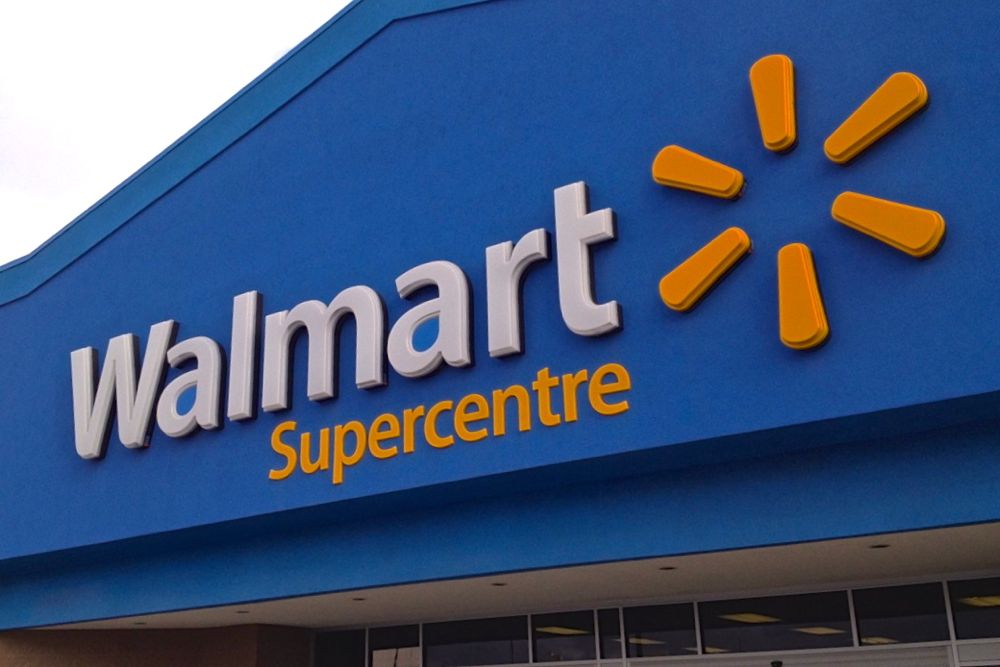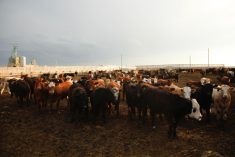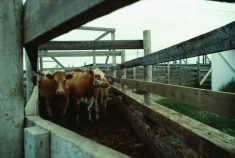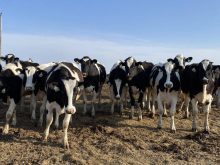The Canadian arm of the world’s biggest retailer has put a number to its previous commitment to source certified-sustainable beef for its grocery business.
Walmart Canada on Thursday announced it has committed to buy 1.5 million pounds of beef sourced from farms and ranches certified to Canadian Roundtable for Sustainable Beef (CRSB) standards over the next calendar year.
That commitment — almost 680.4 metric tonnes of beef — marks “the largest known quantity of beef from certified sustainable Canadian farms and ranches ever sourced by a single retailer,” the company said in a release.
Read Also

U.S. livestock: Cattle strength continues
Cattle futures on the Chicago Mercantile Exchange were stronger on Friday, hitting fresh highs to end the week.
Furthermore, the company said, the amount of beef Walmart Canada sources from CRSB Certified sustainable farms and ranches “will continue to increase each year.”
CRSB certification — which until recent years has been associated mainly with beef purchases by restaurant and quick-service chains — became a sell point for Walmart earlier this year when it committed to supply its Your Fresh Market burger patty line in Canada entirely with CRSB Certified beef.
That label claim allowed Walmart — which already sources all fresh beef for its Canadian stores in Canada — to claim a first among grocery retailers in the Canadian market.
With Thursday’s announcement, however, “committing to sustainable sourcing at this unprecedented level sets a new threshold in the industry for what is possible and reaffirms the company’s partnership with the CRSB,” Walmart said.
“Leadership from organizations like Walmart inspires change and supports the Canadian beef sector’s continuous improvement goals,” CRSB chair Anne Wasko said in the same release.
The retailer said it plans to develop “customer-facing messaging… to share this milestone commitment to sustainable beef sourcing” over the coming months.
The CRSB, set up in 2014, maintains the Certified Sustainable Beef Framework — CRSB Certified, for short — to affirm farms’ and ranches’ sustainable practices through third-party certification and support sustainable commitments for retail and foodservice companies.
The roundtable also aims to build consumer trust through “credible, science-based claims” about sustainable beef production in Canada.
The CRSB last week put out a call for beef producers to take part in a new survey for its National Beef Sustainability Assessment. The new survey went live Friday (Oct. 1) and will be available online until Jan. 7, 2022.
Survey data goes toward the National Beef Sustainability Assessment’s goal of providing a “comprehensive farm-to-fork baseline of the environmental, social and economic sustainability performance of the Canadian beef industry,” and identifying “areas for improvement.”
Other pledges
Walmart’s U.S.-based parent on Wednesday separately announced the CRSB beef agreement as part of a list of new commitments to make Walmart a “regenerative” retailer.
Among other new pledges on that list, Walmart said it plans to reach a 15 per cent absolute reduction in its “virgin plastic” footprint — that is, any plastic produced from new rather than recycled materials — by 2025.
It also said it would expand the scope for its previously announced goal to source 100 per cent more sustainable cotton and 50 per cent recycled polyester for its Private Brand apparel and soft home textiles by 2025, to include not just Walmart stores in the U.S. but also its Sam’s Club U.S. and Walmart Canada Private Brand apparel and home textiles.
It also committed to start buying Pacific Island Tuna (PIT) products for its in-house brand, Great Value. PIT launched on Wednesday as a partnership between The Nature Conservancy and the Republic of the Marshall Islands on environmental, labour and traceability standards.
Walmart Canada in June separately announced a list of “commitments to pollinator health,” including sourcing 100 per cent of fresh produce and floral sold in its stores’ produce departments from suppliers who adopt Integrated Pest Management Practices by 2025.
It also expected to have 10 pollinator gardens planned onsite at Walmart locations by the end of this year. — Glacier FarmMedia Network




















